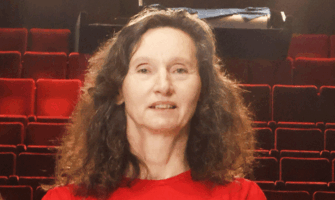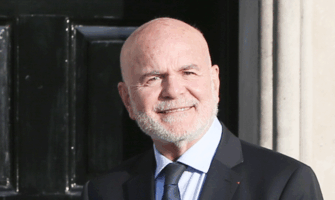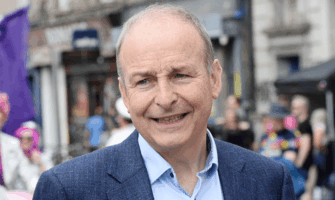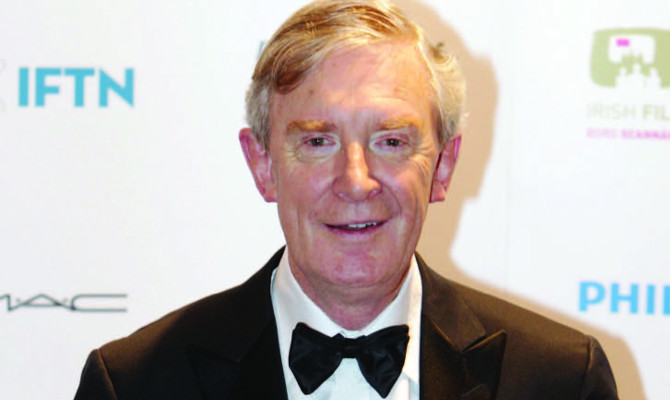
Morgan O'Sullivan
ONE OF the country’s most successful film and television companies, Octagon Films, is set to be wound up by its principals and majority shareholders, Morgan O’Sullivan and James Flynn, following their petition to the High Court on July 6. The move is the latest in a series of manoeuvres by O’Sullivan and Flynn prompted by High Court proceedings lodged against the pair late last year by German production company, and minority (49%) shareholder in Octagon, W2 Filmproduktion und Vertriebs GMBH. For renowned producer O’Sullivan, this is not his first taste of controversy but it threatens to be a plot spoiler.
Winfried Hammacher of Berlin-based W2 claims he had come to believe in recent times that Octagon was inactive as a production company and had not been trading in any meaningful way for several years. He says he then discovered the company was apparently involved in producing more than 70 films and TV series, including series such as Vikings, Love/Hate, The Borgias, The Tudors, and Raw, and feature films including John Michael McDonagh’s Calvary and Neil Jordan’s Ondine.
Hammacher claims that, by his estimation, Octagon was involved in production spending of €800m to €1bn since the company was established in 2001.
As a result, he alleges, Octagon should have earned substantial fees and income, amounting to about €50m, of which W2 would be entitled to half. The German claims W2 has lost considerable income due to Flynn and O’Sullivan allegedly diverting fees and income to other companies they control.
Denying the claim outright, O’Sullivan and Flynn maintain that Octagon is a development vehicle rather than a production company and W2’s interest is only in specific productions. Moreover, say the Irish boys, they are entitled to carry out their own work under the Octagon name.
Elsewhere, Octagon is also named in a personal injury case being taken in the High Court by long established stunt co-ordinator Philippe Zone against the three production companies involved in making the second series of Vikings, filmed in 2013. In addition to Octagon, Flynn and O’Sullivan are also directors of the two other production companies named in these proceedings: VK Two Productions Ltd – a so-called special purpose company for raising the Section 481 tax break money for the second series – and TM Productions Ltd. This latter was set up by O’Sullivan and Flynn in 2005, four years after they established Octagon.
Octagon Films came into existence three weeks after the Irish Film Board (IFB) announced its “company development initiative” on September 1, 2001. The workings of the scheme were outlined in 2004 by James Hickey, then head of entertainment law at MOPs legal firm (and now IFB boss): “The board provided to five companies (Little Bird, Octagon, Treasure, Magma and Element) up to e635,000 each over three years, which had to be matched by the same amount of private sector funding.” Alongside this, Anglo Irish Bank provided a facility to each company.
Things haven’t exactly worked out well for all parties involved, given that both Little Bird and Magma are in protracted liquidation, and Octagon is now set to be wound up, despite the very extensive production activity of each company. In Ireland it has turned out that, outside of animation, the business of making films and television on a sustainable basis is a big ask. The one man who could pull it off is, probably, Morgan O’Sullivan – at 71, now the longest-standing survivor in the Irish, as he calls it, “entertainment business”.
Part of the broadcasting generation that included Bunny Carr, Larry Gogan, Arthur Murphy and Gay Byrne, O’Sullivan started out in the 1950s as a child actor in radio on The Foley Family soap. His first producing credit was in 1979 for Cry of the Innocent, a TV film directed by Michael O’Herlihy and written by Frederick Forsyth, then an Irish resident availing of Squire Hockey’s tax break for artists. It was contact with O’Herlihy that gave O’Sullivan his Hollywood entrée, thanks to the former’s involvement in producing episodes of the hit US TV series, Hawaii Five-O. Learning from the production process freed him from a career spent presenting Late Date on RTE radio.
ATTRACTING US CASH
What differentiated O’Sullivan from others in the nascent film industry in the 1980s was his conviction that long, episodic series, produced for US television, was a business that Ireland could attract. His first production company was Tara Productions Ireland Ltd, set up to attract US moolah. When Pierce Brosnan’s breakout series, Remington Steele, was filming episodes in Europe, Tara picked up useful business from the show’s producer, MTM, by then the biggest independent TV producer in Hollywood. Things moved up a gear with the purchase in 1986 of the moribund National Film Studios at Ardmore by a consortium including MTM Enterprises, O’Sullivan’s Tara Productions and the state.
O’Sullivan was MD of the revitalised studio, renamed MTM Ardmore Studios, which was almost continually occupied, although there were rumblings from the Irish Film & Television Guild that many of the senior technician roles and production grades on some productions were filled by imported personnel – a foretaste of some of the industrial relations issues that would follow O’Sullivan through his producing career.
In July 1988, MTM bought in what was then an unprecedented acquisition of a US production company by a European business, Television South (TVS). The deal meant MTM’s 66% shareholding in the Bray studio was now held by a parent company in the UK. In June 1990, the studio name was formally changed to Ardmore Studios Ltd and a couple of months later, Ossie Kilkenny, Paul McGuinness and James Hickey became directors of the studio, after the first two bought out MTM’s interest. At the time, O’Sullivan’s shareholding in the studio stood at 23,684 shares, while MTM had 300,000 and the state had 150,000.
The state’s holding is today held by Enterprise Ireland, while O’Sullivan’s minor stake was acquired by MTM and, subsequently, McGuinness and Kilkenny. Today, O’Sullivan remains ensconced at Ardmore, where he has had offices since his brief period as managing director of MTM Ardmore began, 30 years ago. He concentrated on servicing US productions in the years after his brief term as Ardmore MD and, as a long-term advocate of a state tax incentive scheme, he was well placed to dive in when Michael Twee brought in the Section 481 (then called Section 35) tax break in 1993 to ‘stimulate’ the industry. Michael Twee also appointed O’Sullivan to the reactivated Irish Film Board that year. During the enthusiastic early days of the public coffers being raided by filmmakers, O’Sullivan had a misadventure with one of the many colourful characters that flocked around the tax break honeypot, looking for regulatory loopholes. In 1993 he linked up with Carlow accountant, Ignatius Forde, in O’Sullivan Forde Productions Ltd. Forde had spotted a lucrative gap in the market, supplying accountancy and tax services to the fledgling film industry, while O’Sullivan was instrumental in bringing the big names in – for example convincing Mel Gibson to bring a sizeable portion of the Braveheart shoot to Ireland.
UNORTHODOX
It was in the wake of the Braveheart production that Forde’s, er, unorthodox handling of tax matters placed a serious question mark over the industry’s relationship with the state (see The Phoenix 26/4/96). A receiver was appointed over the number cruncher’s assets and affairs in 1996, by which time O’Sullivan, who was caught unawares by Forde’s activities, had dropped him as a director of O’Sullivan Forde and the company’s name was changed to O’Sullivan Productions Ireland. It was later changed again to Kyriaco Ltd and it was under this, less identifiable handle, that it eventually quietly ceased to trade in 2002 (although, surprisingly, it was never officially wound up).
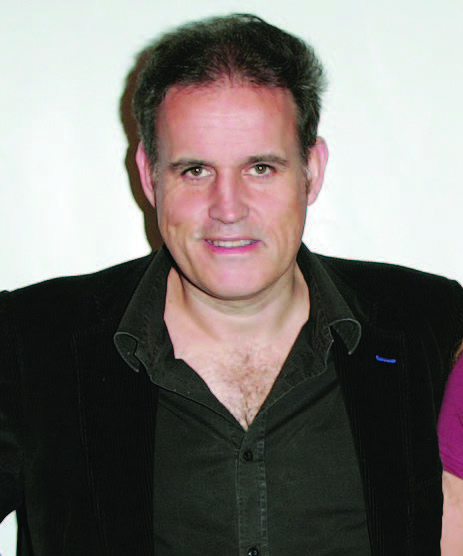
James Flynn
When the 2002 accounts were filed, it was noted that Kyriaco/O’Sullivan Forde was facing contingent claims “arising from the actions of a former director and shareholder in the company” in respect of PAYE/PRSI and interest. Settlement terms were agreed in the High Court between Kyriaco and Revenue, which resulted in Kyriaco lodging €212,000 with the High Court where it was divvied up between the receiver and the Taxman. This was an expensive lesson for O’Sullivan, but he managed to emerge in one piece.
There has also been some friction evident in O’Sullivan’s dealings with the film technicians’ unions after his relations with Disney were dealt a blow some years back by budget overruns on the Jerry Bruckheimer juggernaut production, King Arthur. Disney mostly blamed the unions and the result, according to O’Sullivan, was that the giant Hollywood operation wouldn’t shoot anything in Ireland until the cost structures here were sorted out. “We may need to do a Wapping at the end of the day,” he tellingly noted in a Sunday Times interview. For a perennially smooth operator, this comment was out of character, albeit one that exposed his views on those bolshy unions.
One of the co-production credits on King Arthur went to a company called World 2000 Entertainment Ltd. Chastened by his brush with Forde, O’Sullivan had set up this company in 1996. Although it is thought of as O’Sullivan’s main production vehicle, it has actually relatively few credits under its own name over the 21 years since it was set up, while O’Sullivan has more then 20 producer, co-producer or executive producer credits in his own name over the same period.
World 2000’s accounts for 2015 don’t reveal too much beyond net assets of €68,000, but what is noteworthy is that the company is an 80% subsidiary of an Isle of Man-based company called Entertainment 2000 Ltd – an entity “ultimately controlled by the directors” of World 2000 Entertainment. This refers to O’Sullivan, long-time US producer partner, Tom Palmieri, high profile accountant, Bernard Somers, and the latter’s wife, Marguerite Somers.
In the list of “related party” transactions, the financial statements for World 2000 Entertainments record dealings with Metropolitan Films International, World 2000 Media Services, Foxgrange, VK Two Productions Limited, VK Three Productions, Green Pavilion, TM Productions, and O’Sullivan Productions – all of which feature O’Sullivan as a director.
In the case of TM Productions, which was directly involved in the production of the TV series, The Tudors, O’Sullivan is joined by James Flynn. Metropolitan Films International, meanwhile, was incorporated in 2013 and was previously known as Octagon Films International, until its change of name in June 2015. The other directors of this latter company are James Flynn and his brother, Ronan Flynn. Accounts to April 2015 show related party transactions with five other companies, including O’Sullivan’s World 2000. The total value of transactions with these five companies was just under €400,000.
The opaque picture that emerges is one of a large volume of production activity, incentivised by significant public subsidy (Section 481 tax breaks mostly), but with remarkably little growth in shareholder value. Whether these companies earn any residual income from their output and, if so, why it does not appear on their balance sheets, is exactly the question that is presumably exercising the mind of Winfried Hammacher at W2 in Berlin in relation to Octagon Films.
SECTION 481
Given Octagon Films’ apparent role in developing and producing the popular Vikings series, the question has to be, where did any sales income go? Octagon’s apparent role was acknowledged by the IFB in its own PR fluff, while the company is also specifically mentioned in the tax break investment memorandum for the first series prepared by accountants Crowe Horwath, who raised in the region of €22m in Section 481 funding for the show. The assorted Vikings series have proved very popular and raised bucket-loads of Irish dosh through the Section 481 tax break alone (€45m was invested in the recent series four from this source).
Another link with Vikings comes courtesy of World 2000 Entertainment’s role in securing ‘change of use’ planning permission in 2009 for the conversion of warehousing to film studio space on Joe O’Connell’s sprawling property near Ashford, where Vikings is filmed. On top of which, World 2000 Entertainment has made more recent successful planning applications for the same site in 2011 and 2012, and a further, incomplete application in 2014 for four new sound stages that would at least double the size of the studio complex. This role in the planning process connects Word 2000 directly to the studio at the time the first three hit series of Vikings were being produced there.
Although World 2000 Entertainment is a separate operation from Octagon Films, the proceedings lodged by W2 Filmproduktion are against O’Sullivan and Flynn personally, not Octagon. Therefore, it is unclear what effect, if any, the decision of the two boys to seek to have Octagon Films wound up will have. They say that the company must be liquidated due to irreconcilable differences with the German investor. The 2015 accounts filed last week for Octagon include a note stating that W2 Filmproduktion has “demanded payment of its loan of €164,582 together with an interest penalty on this amount of €186,872. The company has denied this interest penalty claim and that the loan is repayable other than from the proceeds of specific future productions should they be successfully developed.”
The Octagon winding up petition was lodged ten days after these accounts were signed off and is due for hearing in October, as is the next instalment of the Germans’ legal blitz against the two boys. It looks like the the scene is set for a real thriller.















